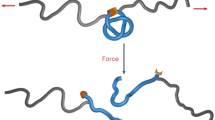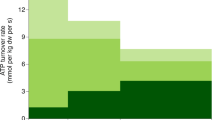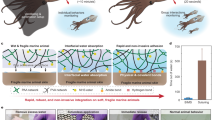Abstract
IT was shown in the previous communication that the ‘threshold-concentration’ of ions of the lyotropic group which produce a rise in tension of the muscles in a vessel increases with increasing diameter of the lyotropic ion. Because this process also works in the absence of oxygen, we might assume that a discharge of protein ions takes place which causes a change of state. We presume that this change of state also produces a change in the visco-elastic behaviour.
This is a preview of subscription content, access via your institution
Access options
Subscribe to this journal
Receive 51 print issues and online access
$199.00 per year
only $3.90 per issue
Buy this article
- Purchase on Springer Link
- Instant access to full article PDF
Prices may be subject to local taxes which are calculated during checkout
Similar content being viewed by others
References
Betticher, A., Hardung, V., and Maillard, J., Kolloid Z., 148, 66 (1956).
Author information
Authors and Affiliations
Rights and permissions
About this article
Cite this article
HARDUNG, V., LASZT, L. Visco-elastic Behaviour of Blood Vessels of the Muscular Type. Nature 187, 330–331 (1960). https://doi.org/10.1038/187330a0
Issue Date:
DOI: https://doi.org/10.1038/187330a0
This article is cited by
-
Vergleichende Untersuchungen zur statischen und dynamischen Wanddehnbarkeit von Vena cava und Aorta des Kaninchens
Pfl�gers Archiv European Journal of Physiology (1969)
-
Properties of Vessel Muscle Proteins extracted with Water or Salt Solutions of Low Ionic Strength
Nature (1961)
Comments
By submitting a comment you agree to abide by our Terms and Community Guidelines. If you find something abusive or that does not comply with our terms or guidelines please flag it as inappropriate.



